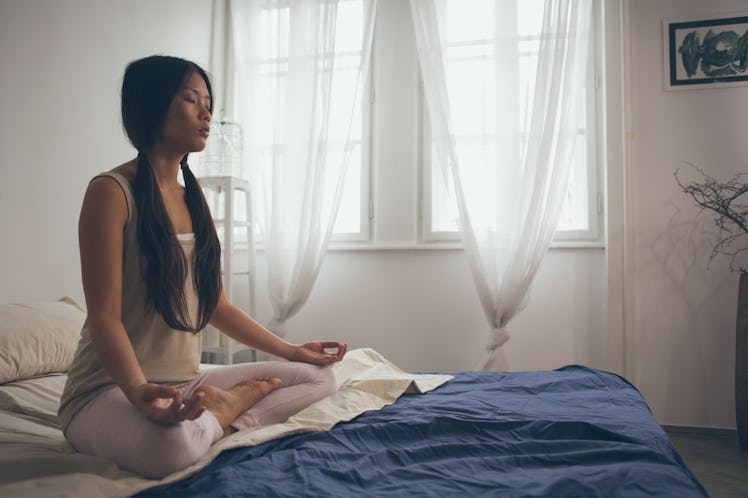
5 Science-Backed Ways Yoga Helps You Sleep Better, Faster & Longer
The National Sleep Foundation estimates that adults, ages 18-64 require seven to nine hours of sleep. But sometimes finding the time to sleep is harder than it looks. Around 40 percent of the U.S. population gets less than the recommended seven hours of sleep. The reasons for this vary, as we will see, but the result is the same: We need to get more rest. But can yoga help you sleep better? Let's find out.
The outside influences keeping you from a decent night’s sleep are usually a simple fix: Room’s too warm? Turn down the thermostat. Too bright? Try a sleep mask or blackout curtains. Noisy? Earplugs or a white-noise machine. Hairy? Your companion animal just might have to sleep elsewhere (OK, they’re not all easy decisions).
Sometimes, the culprit is larger — like, California king-size larger. “You wouldn’t expect a pair of athletic shoes to last longer than seven or eight years with daily use; it would be unhealthy for your feet,” says Gabriel Smith, a sleep expert with Sleep Train. “The same is true of the bed you use every night. If you’re not sleeping well, consider if it’s time to replace your mattress.”
Or, maybe it’s not them… it’s you. If you’re a bundle of nerves who can’t wind down at bedtime without chemical assistance, no ocean-sound generator or new bed is likely to help you sleep better. But the exercise you might already be practicing to begin your day could be surprisingly beneficial in helping you end it. As Michael J. Breus, PhD, observes in Psychology Today,
“The pleasures and benefits of yoga are widely understood: yoga can improve physical strength and flexibility, improve breathing, reduce stress and enhance mental focus... What may be less well-known are the positive effects that yoga can have on sleep.”
So, how can stretching out help you sleep in?
1. Yoga Reduces Stress
The most obvious and instantaneous benefit of yoga is the reduction of cortisol (a.k.a. the “stress hormone”) levels in the brain. When in the mindful mode of yoga, you’re focused on “being” rather than “doing,” aware of your thoughts but not inclined to take any action or trigger emotional stressors.
Reduced stress is beneficial in nearly every area of your life, but just imagine how it translates when your head hits the pillow and you're not worrying about every little thing going on in your life. Falling asleep has never been this easy.
2. Yoga Can Be Your Bedtime Routine
Setting a regular nighttime ritual — or, in decidedly unsexy terms, “sleep hygiene” — is as important as establishing a morning workday routine, if not more so. Also, turning off the news and running a regular yoga sequence at bedtime could be just as good for your sanity as your sleep.
Getting both your body and mind in the habit of recognizing when it's "bed time," so to speak, will help train you to fall asleep more naturally and to feel sleepy in a more regulated way.
3. Yoga Stabilizes The Nervous System
Chances are, you’ll experience hyperarousal during your day, a tense instance where your “fight or flight” senses are engaged, which can keep you awake later even when you’re exhausted.
Yoga can bring you to homeostasis, your nervous system’s “rest and digest” state, within minutes. With a yoga routine, you can mind can naturally unwind from this tension and relax into sleep more easily.
4. Yoga Eases Pain And Discomfort
Maybe sleeping with back pain, joint pain, muscle stiffness, or any physical discomfort is something you’ve convinced yourself to “just live with,” but it needn’t be that way.
Yoga movements can increase mobility and strength, without undue stress, in swollen, painful joints. Yoga won't only relax your brain, it will ease your body into a deep and refreshing sleep.
5. Yoga Tells The Brain To “Shut Up”
It’s not just physical: “The breath links the mind and our body,” writes 30-year yoga instructor Laura Yon. “As the breath slows down and our movements mirror the speed of the breath, the mind naturally becomes more spacious… and we settle into the deep quiet that has always been there.”
There are many variations on the ideal bedtime yoga routine; some sources offer just three poses, while others go as high as 10.
Splitting the difference, the Harvard Health Publishing blog recommends seven poses to relieve tension and stress at the end of the day, with an emphasis on breathing,
“Your breath is key to be able to relax in these poses. Breath in yoga is equally important — if not more important — as the physical pose. Practice these yoga poses right before bedtime, and stay in them about three to five minutes each. The more that you practice these poses regularly, the more likely you can get a good night’s rest.”
Don't suffer from inadequate sleep. Don't spend hours in bed with your mind racing, anxious about everything you need to do. Don't live with aches and pains that keep you up at night.
Yoga is holistic. It'll help you mind, body, and soul. Sleep is essential to health and happiness; don't scrimp on getting the most of it.
Welcome to No Sweat: an exhausted girl's guide to squeezing in fitness. This content package is for the woman who wants to find an exercise routine that doesn't feel like a chore. No Sweat isn't changing the shape of your body; it's about feeling stronger, happier, and more energetic. Because working out doesn't mean you have to break a sweat.